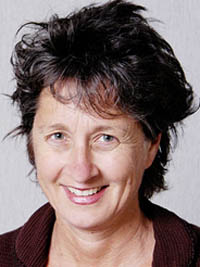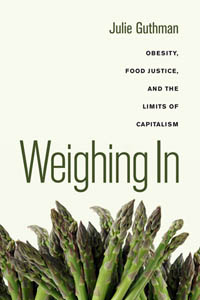Campus News
Beyond calories and consumption, new book critiques obesity orthodoxies
Julie Guthman, associate professor of community studies, challenges many widely held assumptions about the “obesity epidemic” in her new book, “Weighing In: Obesity, Food Justice, and the Limits of Capitalism.”


Countering the so-called obesity crisis with local, organic, and seasonal food is a nice idea but one that is not likely to work, writes Julie Guthman, associate professor of community studies at UC Santa Cruz.
Guthman challenges many widely held assumptions about the “obesity epidemic” in her new book, Weighing In: Obesity, Food Justice, and the Limits of Capitalism (University of California Press, 2011). “I have nothing against “good food” – I eat it myself,” says Guthman, a self-confessed “foodie” whose father could be called a health-food nut in the 1950s and ’60s, “but the approach is based on assumptions about obesity’s causes and consequences that don’t hold up to scrutiny.”
While she acknowledges that Americans have gotten bigger over the past several decades Guthman is not convinced that obesity is the problem it’s made out to be. “The way statistics are constructed and presented tend to overstate the problem,” she says. For example, the body mass index (BMI), a ratio of height to weight, “doesn’t take into account people with big bones or lots of muscle.”
And besides it’s not necessarily the case that being bigger is unhealthy, she says, referencing studies that show people in the “normal” range of BMI do not live longer than those who are overweight or even slightly obese. “In general, we need to be more concerned with pathology and less with size.”
The widely accepted direct cause of obesity is a disrupted energy balance – too many calories taken in, not enough energy expended through exercise to burn them off. But it’s more complicated than that, according to Guthman’s analysis.
First, socioeconomic status is strongly correlated to weight, Guthman writes. Many assume that the reason poor people are bigger is that they can only afford to buy cheap, fattening food. “But there’s more to the story,” she says. “Studies have shown that fat people are subject to discrimination in education, job placement, wages, and health care. Thinness doesn’t guarantee high status, but obesity pretty much guarantees low status. So maybe low economic status is as much a consequence of obesity as a cause.”
Then, there are environmental factors. Guthman points to studies that suggest that toxins in our air, water and food contribute to the body storing fat. “Emerging research is showing environmental toxins may be playing a big role in obesity, in ways that have little to do with people’s daily habits. Many of these toxins are endocrine disrupting chemicals that can affect development before birth, for example by directing stem cells with no particular destination to become fat cells,” she says.
Guthman draws on both political-economic and cultural analysis to find out what’s making us fat and whether it matters. She looks at the current culture of “healthism,” the industrial food system, socioeconomic factors, and capitalism itself. Basically, she argues, we have a political economy of bulimia. We’re supposed to keep the economy afloat by consuming and not interfering with the business of the business, but we’re also supposed to exercise discipline and self-restraint in ways that are equally kind to capitalism.
Guthman concludes that fixing the food system must go far beyond the question of “what to eat” and engage with policy. Not only food and farming policy, but immigration policy, trade policy, tax policy and environmental regulation. “All have had a role in making cheap, nutritionally vacuous food and making people dependent on it,” she says. “Food needs to be regulated at the point of production, not consumption.”
Guthman’s overall point is that we’re so sure about the causes and implications of obesity that we’re not looking in other places. “When we test our assumptions we get a much more complicated picture.”